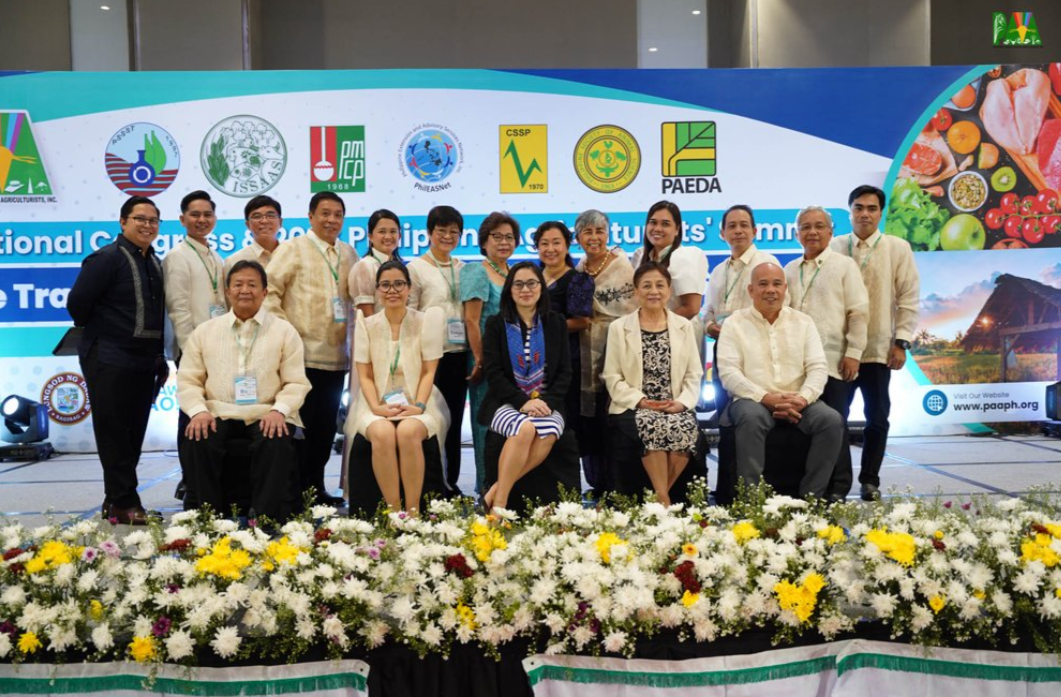The Philippines heavily relies on agricultural food systems to sustain its population. However, the country's current food systems are vulnerable to disruptions, threatening the nation's food security. It is crucial to establish food systems that are both resilient and sustainable to guarantee continuous and improved access to food for the population.
In its pursuit of providing a unified and focused direction for the country's agricultural research, the Philippine Council for Agriculture, Aquatic and Natural Resources Research and Development of the Department of Science and Technology (DOST-PCAARRD) co-sponsored the 10th Philippine Association of Agriculturists, Inc. (PAA) National Congress and 2023 Philippine Agriculturists' Summit held at SMX Convention Center in Davao City, Davao Del Sur, from July 25 to 27, 2023.
Themed, "Sustainable Transformation of Philippine Agro-Food Systems," the discussion centered on transforming the country's food systems and addressing significant challenges within the agriculture sector. The summit was participated by distinguished and esteemed individuals from the public, private, and academic sectors, who shared their insights and expertise to stimulate the transformation needed in the agro-food systems.
Dr. Arsenio M. Balisacan, Secretary of the National Economic and Development Authority (NEDA) keynoted the event highlighting the importance of developing and implementing strategic and sustainable production technologies and promoting commodity diversification. He also emphasized that the summit's theme complements the Philippine Development Plan (PDP) 2023 - 2028, which promotes holistic and comprehensive development strategies to improve agro-food systems, empower local farmers, and reduce adverse environmental impacts to the industry.
The conference comprised five plenary sessions, each addressing distinct aspects of the agricultural food systems transformation in the country. Experts from diverse agricultural disciplines shared their expertise and guided the discussions within these sessions.
The initial session delved into the existing challenges within the agro-food system, with emphasis on soil health and climate change. The second session centered on agricultural policy and strategy in the digital era, focusing on monetary policy, financial inclusion, and cybersecurity risks associated with the digitalization of the agriculture sector.
The second day of the conference focused on the resilience and sustainability of agri-food systems. Representatives from private organizations shared their initiatives and best practices concerning regenerative agriculture and nature-based solutions to enhance resilience and sustainability.
Following this, a plenary session titled, "Growing Green to Carbon Neutrality: The Role of Agriculturists" took place. The speakers emphasized the significance of initiatives such as the Web-based Integrated Spatial Engine and Smart Ecosystem (WISE) Carbon Farming and achieving sustainable food systems through a bio-circular economy. They highlighted the role of integrative food and nutrition security as a context for the sustainable transformation of agro-food systems in the Philippines.
During the parallel learning sessions, attendees exchanged ideas, shared experiences, and discussed best practices on various topics, including nurturing farm schools amidst emerging trends in agricultural education technology, transformation of agricultural extension delivery systems, and initiatives of Local Government Units (LGUs) in promoting sustainable agriculture and food security.
The fifth plenary session on the updated strategy framework to ensure food security and proper nutrition discussed the following topics: the role of the Department of Trade and Industry (DTI) in enhancing efficiency of agro-food systems, reducing vulnerabilities and protecting purchasing power, as well as the imperatives and innovation for the strategy frameworks on food security and nutrition.

Keynote and plenary speakers during the 10th PAA National Congress and 2023 Philippine Agriculturists’ Summit (1st day). (Image credit: Philippine Association of Agriculturists, Inc. [PAA])
The three-day congress provided a platform for deliberating four significant transitions essential for transforming food systems: building resilient food supply chains, promoting healthy diets, advocating regenerative farming practices, and emphasizing conservation efforts. Key personnel from DOST-PCAARRD's Socio-economics Research Division (SERD), Technology Transfer and Promotion Division (TTPD), and Livestock Research Division (LRD) actively participated in the summit.
Sponsoring these events help DOST-PCAARRD in remaining committed to advancing the country’s agricultural research and development by fostering connections and collaborations within the agriculture, aquatic, and natural resources sector.

![Participants during the 10th Philippine Association of Agriculturists, Inc. (PAA) National Congress and 2023 Philippine Agriculturists' Summit (Image credit: Philippine Association of Agriculturists, Inc. [PAA])](/images/2023/12/13/187-1.png)